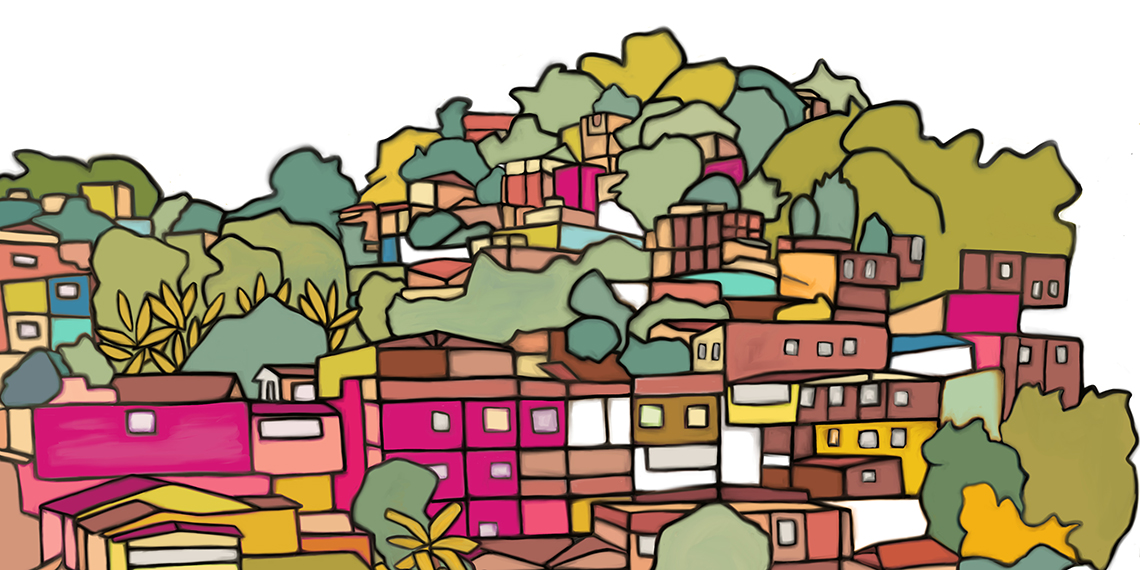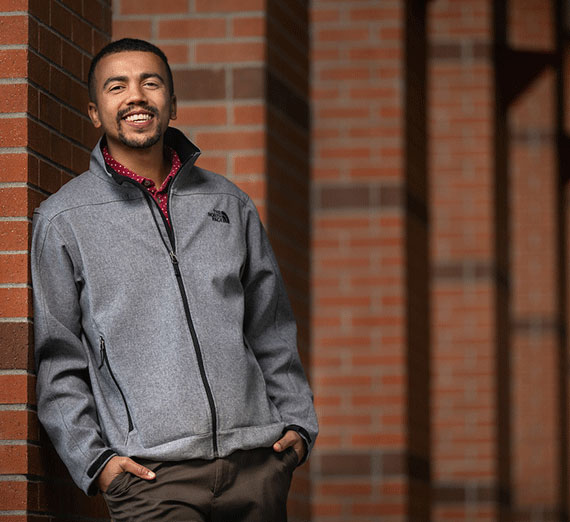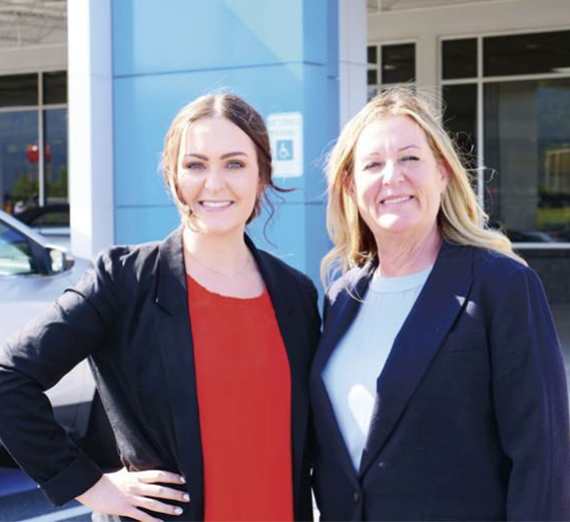Learning in Solidarity
Close-up encounters in Colombia lead Gonzaga alumni to launch a nonprofit supporting the community development organizations they saw in action

(Illustration by Elizabeth Pierce)
Studying abroad is a popular avenue for Zags across majors and schools. With opportunities ranging from weeks to multiple semesters, undergrads and graduate students immerse themselves in language and culture to supplement their learning. While many alumni testify years later how much they gained from their cross-cultural experiences, it’s rare for this community engagement to persist in a hands-on manner after returning home.
Ryan McLean (M.A. ’19) left his organizational development immersion with a desire to remain in solidarity with the grassroots organizers he saw in action in Cali, Colombia. Shortly after his return, he founded a nonprofit organization that continues to foster connections between Gonzaga’s alumni and those community leaders.
Communication and Community Development, a two-week course in the School of Leadership Studies, takes graduate students to Cali, where residents living on the margins strive to recover from decades of internal conflict and displacement. With little representation in the mainstream media and limited access to basic needs like running water and public transportation, people in Cali are pioneering new spaces for shared stories and experiences. A group of women, led by local professor Yeiffer Molina, launched a radio station called Oriente Estéreo to lead discussions about social issues such as domestic violence, gender and racial inequality and access to government and nongovernment resources. Another radio project offers a creative theater and arts program for high school students, and a movie initiative called Cine Pál Barrio provides a safe space for residents to watch and produce stories of local struggles.
The chair of the graduate Communication and Leadership Studies program, Pavel Shlossberg, Ph.D., created the course that allows GU students to learn from these projects through a long partnership with Universidad Javeriana in Colombia. Past students like McLean and Morgan Owen (M.A. ’18) used digital humanities technology to create a map pinpointing resources like bus stations, hospitals, theaters and libraries. Students also shared stories through Cine Pál Barrio about the new community projects, and the barriers and accomplishments leaders have seen while seeking to transform their neighborhoods. Friendships formed, too; Many of the Gonzaga participants become deeply connected to Cali residents’ desires to frame their own narratives and to unite community members through storytelling.
“We view this in terms of solidarity. It’s not a nonprofit coming in to save poor people. It’s a partnership.”The immersion is brief but intense. McLean, inspired by leaders like Molina, wanted to continue learning and contributing in some capacity.
“We had the opportunity to raise awareness of these leaders by capturing the personal stories of people who have been displaced,” McLean says. “I was thinking about these amazing people, the incredible work that was taking place, how humbling it was to learn from people with such great capacity and skill. I thought, ‘I want to stay connected to this work.’”
Operating in economically disadvantaged communities with little government support, projects like Oriente Estéreo rely entirely on the contributions of volunteers. Without collateral, lenders won’t provide support. Licensing, funding and staffing are major obstacles, and leaders are cautious of supporters with hidden agendas – financial sponsors, for example, who want to alter or censor the Colombians’ stories. McLean offered to purchase for Oriente Estéreo a new antenna that could expand its broadcasting range. Molina politely declined his offer, a moment McLean now reflects on as a learning opportunity.
“Americans tend to think about solving problems through money,” McLean says. “We tend to communicate, whether we know it or not, a savior mentality, like ‘I’m here to save you and fix you …’ And there’s kind of a quid pro quo, like ‘I’m going to want something back for this.’ ”
McLean expressed his desire not to save, but to continue learning from the leaders he met in Colombia. Through Molina, he launched the Leadership Engagement Opportunity (LEO) Fund to address financial barriers and achieve positive social change by providing equal opportunities for development. To receive grant money, Colombian organizations may submit applications describing their project’s community and social justice impacts and their intentions for the grant money. The LEO Fund aids these projects but remains in the background, Shlossberg said, empowering the locals to apply resources as they see fit.
“We view this in terms of solidarity. It’s not a nonprofit coming in to save poor people. It’s a partnership. We’re just trying to help support really amazing work and, in return, learning and being transformed ourselves,” McLean says. As he began formulating the fund and learning how to establish an international nonprofit, other alumni from the immersion course expressed interest in getting involved.
McLean, Owen and Linda Hobrock (M.A. ’18) had participated in the immersion program twice and worked with the women of Oriente Estéreo. The experience became the core of Hobrock’s thesis research, and the reason for her interest in supporting the fund.
Owen came to Gonzaga’s School of Leadership Studies with a passion for community development. The energy, compassion, vulnerability and activism she witnessed during the immersion left a strong impression. After hearing about the emerging LEO Fund from McLean, Owen joined the team and helped create marketing and communication documents, such as an initial business plan and materials for the nonprofit’s website and social media.
These associations among Gonzaga alumni came to fruition in fall 2019, when the LEO Fund selected its first projects to support. Hobrock hopes the LEO Fund will be self-sustaining, with numerous funding applications, and strong, trust-based relationships with the local leaders. McLean’s vision for the LEO Fund is to be a resource that promotes social justice, acts with honesty and transparency, promotes cultural diversity and establishes egalitarian relationships. For them all, the LEO Fund symbolizes a potential for positive, tangible impacts and growing connections between people.
“It’s a new approach to community development. A way to build this international solidarity, to approach development from a point of equity and inclusion,” Owen says. “What we’re really trying to do is to put local voices first, and have them at the forefront and the core of everything. We are a resource for people to define and create their own solutions, because who knows better than they do?”
Undergraduate and graduate students in the School of Leadership Studies have several opportunities to study in immersive environments, like this class in Cali, Colombia.
Learn more here.
- Academics
- Diversity & Inclusion
- Global Impact
- Online Programs
- School of Leadership Studies
- Academic Vice President
- Alumni
- Comprehensive Leadership Program
- Gonzaga Magazine




